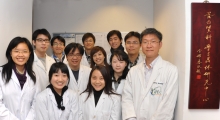CUHK
News Centre
CUHK School of Life Sciences Research Paves Way for Development of Better Biotech Enzymes
A research team led by Professor Kam-bo Wong of the Centre for Protein Science and Crystallography, School of Life Sciences at The Chinese University of Hong Kong (CUHK) demonstrated a fundamental principle in changing the activity of enzymes by means of protein engineering. The findings will provide potential insights into the future design of biotechnologically important enzymes, and was published in the March issue of PLoS Biology, the top ranking journal in biology.
Enzymes are proteins that speed up chemical reactions. They have many applications in the biotech industry. For example, the sugars added to soft drinks are converted from starch by the action of enzymes. Enzymes are also included in laundry detergent to digest protein stains, which are otherwise very difficult to remove.
Can you imagine boiling an egg that refuses to harden? That is possible if the egg's proteins were thermophilic. The egg turns hard because the heat denatures the egg proteins and causes them to aggregate. Proteins from thermophiles, organisms that live in high temperatures, are more resistant to heat denaturation than those from mesophiles, organisms that live in moderate temperatures. In nature, enzymes from microbes that thrive in extremely hot habitats like hydrothermal vents can remain stable even at 100℃. These thermophilic enzymes are useful for the biotech industry because of their superior stability.
Professor Wong's research team has been working on thermophilic proteins for more than 10 years. One intriguing problem is that thermophilic enzymes are less active than their mesophilic homologs despite having similar structures. 'It is like two cars having similar engines but one runs 10 times faster than the other. If thermophilic enzymes can be made more active without compromising their stability, it will be of great commercial value to the biotech industry,' explained Professor Wong.
In the study published in PLoS Biology, his research team used the technique of protein engineering to investigate why thermophilic enzymes are less active. They discovered that thermophilic acylphosphatase has a unique property in that its active site is rigidified by a salt-bridge. 'Thermophilic enzymes tend to have more stabilizing interactions like salt-bridges. Just like one could use more screws to stabilize a wardrobe,' said Professor Wong. By removing this salt-bridge, his team converted thermophilic properties of acylphosphatase to mesophilic-like properties. Likewise, a mesophilic acylphosphatase from human was engineered to become thermophilic-like by introducing the salt-bridge. Professor Wong's team concluded that the rigidifying salt-bridge increases the activity of enzymes at high temperatures, but at the same time scarifies the activity at low temperatures. The principles learned from Professor Wong's study will hopefully guide the improvement of enzymes in the biotech industry.
Professor Wong is an expert in protein engineering, and sits on the editorial board of the journal Protein Engineering, Design and Selection. He is the deputy director of the Centre for Protein Science and Crystallography at CUHK, which was established in 2005 to promote protein research within the local community. Since its establishment, scientists of the centre have received more than HK$ 35 million in funding from the Research Grants Council, the University Grants Council, the Croucher Foundation and the Research Fund for the Control of Infectious Diseases.





